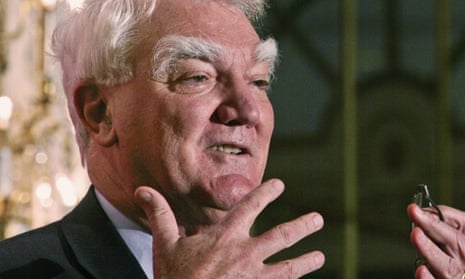The former chairman of Shell has said that investors moving their money out of fossil fuel companies is a rational response to the industry’s “distressing” lack of progress on climate change.
Sir Mark Moody-Stuart, who spent almost four decades at Shell and rose to be its chairman, also said the big oil and gas companies had been calling for a price to be put on CO2 emissions for 15 years but had done little to make it happen. His striking remarks are the most supportive of divestment made by any senior figure in the fossil fuel business. They will also be chastening for Shell. The company is currently positioning itself to be part of the solution to climate change rather than part of the problem, but faces criticism of its Arctic and tar sands operations.
Moody-Stuart, a geologist, spent 39 years in Shell, finally stepping down in 2005, and was chairman of mining giant Anglo American from 2001 to 2009.
He was gloomy about the prospects of the world beating global warming. “I have met precious few people who think we will stay within 2C,” he said. “But one encouraging sign is a much higher level of interest from investors.” The shareholder resolutions passed recently asking Shell and BP to provide more information on their responses to climate change would not have happened 10 years ago, he said.
But he also approved of fossil fuel divestment, a fast-growing and UN-backed campaign to persuade investors to dump their stocks, on the basis that current reserves of coal, oil and gas are already several times greater than could be safely burned. The Guardian’s Keep it in the Ground campaign is highlighting the divestment argument and calling on the world’s two largest medical charities - the Bill and Melinda Gates Foudnation and Wellcome Trust - to divest their endowments from fossil fuels.
“Divestment is a rational approach,” Moody-Stuart said, speaking at a dinner in London organised by Carbon Trust, which provides advice to businesses on reducing emissions. “If you think your money can be used somewhere else, you should switch it. Selective divestment or portfolio-switching is actually what investors should be doing.” He pointed out that all the major oil and gas companies divested their considerable coal operations in the 1990s. “It was a perfectly rational decision.”
Moody-Stuart condemned the lack of industry progress in addressing climate change. “I find it quite distressing that 18 years after major oil companies, such as BP and Shell, acknowledged the threat of climate change, and the need for precautionary action, and began to put in place modest steps to address it, that the world in general and the industry has made remarkably little progress,” he said.
Moody-Stuart added: “There are two realities acknowledged by most businesses. The first is the needs that have to be met today [but] business leaders also recognise there will at some point be radical change, and industries will be completely transformed. The gap between how we get from one to the other hasn’t really closed.”
The oil and gas majors should be developing carbon capture and storage (CCS) quickly, Moody-Stuart said. “The industry has a real role to play in CCS. We can do it and it can be perfectly safe. it is not rocket science.”
He said a key problem was the vast infrastructure needed for CCS, on the same scale as the existing oil business. “CCS has the potential to have a major impact but I worry because of the scale and we haven’t made much progress with it.”
On Monday, Europe’s six biggest oil and gas companies called for “widespread and effective” carbon pricing to be part of the solution that emerges from crucial UN climate change talks in Paris in December. The letter was signed by the chief executives of Shell, BP, BG Group, Eni, Statoil and Total.
“Being blatantly honest, it is not new,” said Moody-Stuart. “They have been saying it for 15 years. The real question is now what are we going to do about it.”
Moody-Stuart, 74, said he was often asked how long the fossil fuel industry could survive. He said: “I am going to be dead well before the end of the oil and gas industry.”

Comments (…)
Sign in or create your Guardian account to join the discussion